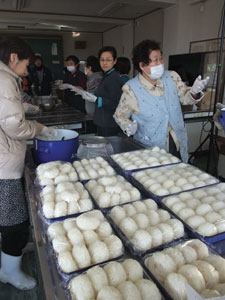 Jewish federations have so far raised nearly $1 million to support the victims of the 9.0 magnitude earthquake that struck near the coast of Japan on March 11. Those funds are being used in part to help pay for the American Jewish Joint Distribution Committee’s continuous, on-the-ground response in Japan. The deadly earthquake, ensuing tsunami and continuing nuclear crisis have left a reported 10,800 dead, while more than 16,000 remain missing and over 190,000 are living in shelters.
Jewish federations have so far raised nearly $1 million to support the victims of the 9.0 magnitude earthquake that struck near the coast of Japan on March 11. Those funds are being used in part to help pay for the American Jewish Joint Distribution Committee’s continuous, on-the-ground response in Japan. The deadly earthquake, ensuing tsunami and continuing nuclear crisis have left a reported 10,800 dead, while more than 16,000 remain missing and over 190,000 are living in shelters.
The JDC is now partnering with the Israel Defense Forces Field Hospital that will be operating in Minamisanriko, one of the many cities decimated by the earthquake and subsequent tsunami. JDC — which previously supported IDF Field Hospitals in Haiti and Turkey — will be providing equipment such as an infant ventilator and portable ultrasound as well as life-saving antibiotics and other medications.
Kansas Citian Patricia Uhlman believes it’s important for Jews here to know how the world Jewish community is helping these victims.
“The Joint is considered a transparent, responsive, reliable conduit for humanitarian aid dollars. The Jewish communities of North America can be very certain that their funds are going to be utilized effectively and in a very timely way to provide need to those in Japan who need it at this time,” said Uhlmann, who is chairperson of the JDC’s international development program that oversees all the international non-sectarian aid and trauma relief needed for all manmade and natural disasters.
She added that since the situation on the ground is “so fluid and traumatic,” the JDC is constantly re-evaluating it in order to respond in the appropriate way.
Uhlmann also wants to point out that the world-wide Jewish community, through the Federation system and allocations to the Joint, is one of the top contributors in the world of financial aid.
“We raised $30 million to help the victims of Hurricane Katrina and almost $10 million for the tsunami in in Southeast Asia in 2004. So the Jewish community should be incredibly proud of the work that is being done on behalf of the victims in Japan,” Uhlmann said.
“It’s part of our value system to be concerned not just about our own family but the family of man,” she continued.
JDC CEO Steven Schwager said it’s been the organization’s experience in other earthquakes and tsunamis that the kind of unparalleled medical treatment the JDC will help bring through the IDF Field Hospital is vital to the recovery of the Japanese people.
“Even as we quickly provide these services during the emergency phase of our response, JDC is monitoring needs and assessing projects to help improve local lives in the longer-term,” said Schwager, who visited Kansas City last year.
In the two weeks since Japan was struck, JDC has provided:
• food, fuel, blankets, tents, and other emergency supplies to evacuation centers through the International Rescue Committee;
• emergency supplies to the hardest-hit Miyagi and Fukushima prefectures through JEN, a Japanese NGO and the Jewish Community of Japan;
• learning materials, teaching aids, emergency school supplies, among other services at child-friendly spaces for Japanese children through the U.S. Fund for UNICEF/Japan Committee for UNICEF;
• a critically needed water shipment and other emergency relief supplies through JDC’s partner Afya Foundation and the Japanese International Cooperation Agency (JICA), Japan’s aid and development arm;
• food and water bottle distribution from Chabad’s bakery in Sendai.
The Jewish Federation of Greater Kansas City is continuing to accept donations for the emergency relief fund to provide aid and support victims in Japan. Donations may be made online at the Federation’s website, www.jewishkansascity.org. Credit card donations may also be made over the phone by contacting Gail Weinberg at (913) 327-8123. Donations may be mailed to: The Jewish Federation of Greater Kansas City, Att: Pacific Relief Fund, 5801 W. 115 St., Suite 201, Overland Park, KS 66211.



